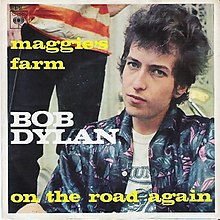Maggie's Farm
| "Maggie's Farm" | ||||||||||||
|---|---|---|---|---|---|---|---|---|---|---|---|---|

Cover of the 1967 Dutch single
|
||||||||||||
| Single by Bob Dylan | ||||||||||||
| from the album Bringing It All Back Home | ||||||||||||
| B-side | "On the Road Again" | |||||||||||
| Released | June 1965 | |||||||||||
| Format | 7" | |||||||||||
| Recorded |
|
|||||||||||
| Genre | ||||||||||||
| Length | 3:51 | |||||||||||
| Label | Columbia | |||||||||||
| Writer(s) | Bob Dylan | |||||||||||
| Producer(s) | Tom Wilson | |||||||||||
| Bob Dylan singles chronology | ||||||||||||
|
||||||||||||
|
||||||||||||
| 11 tracks |
|---|
|
"Maggie's Farm" is a song written by Bob Dylan, recorded on January 15, 1965, and released on the album Bringing It All Back Home on March 22 of that year. Like many other Dylan songs of the 1965–66 period, "Maggie's Farm" is based in electric blues. It was released as a single in the United Kingdom on June 4, 1965, and peaked at #22 on the chart.
The lyrics of the song follow a straightforward blues structure, with the opening line of each verse ("I ain't gonna work...") sung twice, then repeated at the end of the verse. The third to fifth lines of each verse elaborate on and explain the sentiment expressed in the verse's opening/closing lines.
The song, essentially a protest song against protest folk, represents Dylan's transition from a folk singer who sought authenticity in traditional song-forms and activist politics to an innovative stylist whose self-exploration made him a cultural muse for a generation. (See "Like a Rolling Stone" and influence on The Beatles, etc.)
On the other hand, this biographical context provides only one of many lenses through which to interpret the text. While some may see "Maggie's Farm" as a repudiation of the protest-song tradition associated with folk music, it can also (ironically) be seen as itself a deeply political protest song. We are told, for example, that the "National Guard" stands around the farm door, and that Maggie's mother talks of "Man and God and Law." The "farm" that Dylan sings of can in this case easily represent racism, state oppression and capitalist exploitation.
In fact this theme of capitalist exploitation came to be seen by some as the major theme of the song. In this interpretation, Maggie's Farm is the military industrial complex, and Dylan is singing for the youth of his time, urging them to reject society.
Critical responses are ambivalent. The common thread is that Dylan is pointing the finger of refusal and declaring his self-possession.
"Maggie's Farm" is described by critic Bill Wyman in Salon.com as "a loping, laconic look at the service industry." Music critic Tim Riley described it as the "counterculture's war cry," but he also notes that the song has been interpreted as "a rock star's gripe to his record company, a songwriter's gripe to his publisher, and a singer-as-commodity's gripe to his audience-as-market." However, Allmusic's William Ruhlmann also notes that "in between the absurdities, the songwriter describes what sound like real problems. 'I got a head full of ideas/That are drivin' me insane,' he sings in the first verse, and given Dylan's prolific writing at the time, that's not hard to believe. In the last verse, he sings, 'I try my best/To be just like I am/But everybody wants you/To be just like them,' another comment that sounds sincere." One of the critical responses to the song, favored by many contemporary fans, is that of film director Todd Haynes. In his Dylan biopic I'm Not There, the song debuts at the Newport Folk Festival, with Dylan and his band firing machine guns at the crowd. At the conclusion of the performance, Haynes' Dylan declares to a cartoonish folk-protest audience: "I'm sorry for everything I've done, and I hope to remedy it soon."
...
Wikipedia
